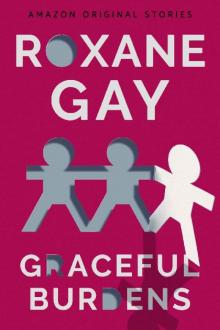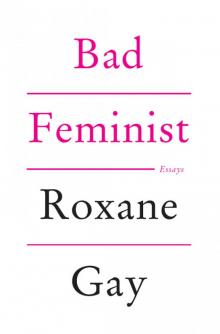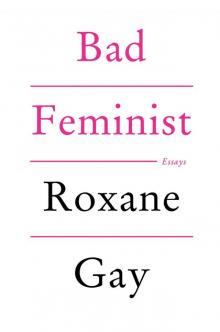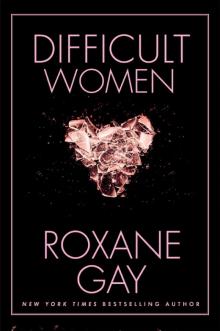- Home
- Roxane Gay
Hunger Page 9
Hunger Read online
Page 9
There is the commercial where Oprah glows as she tells us she has eaten bread every day in 2016, and still the world continues to turn. Or the commercial where she shouts, “I love chips!” There is the commercial where she is cooking and crowing about all the pasta she gets to eat. By the grace of Weight Watchers, she is able to control her body and enjoy carbohydrates. There is the inspirational commercial where she boasts of having lost forty pounds, which, I imagine, means that finally she is living her best life.
In yet another commercial, Oprah somberly says, “Inside every overweight woman is a woman she knows she can be.” This is a popular notion, the idea that the fat among us are carrying a thin woman inside. Each time I see this particular commercial, I think, I ate that thin woman and she was delicious but unsatisfying. And then I think about how fucked up it is to promote this idea that our truest selves are thin women hiding in our fat bodies like imposters, usurpers, illegitimates.
In this same commercial, Oprah goes on to talk about how weight problems are never just weight problems, that there is often more to the story. This is often indeed true, but self-actualization, the catharsis of confronting demons is not what Oprah is truly selling. Instead, she is telling us that our ultimate goal is this better (th)inner woman we’re supposed to diet toward. We will have our better body, and her empire will continue to grow.
38
Gossip magazines keep us constantly abreast of what’s happening to the bodies of famous women, the better to keep the rest of us in line. The weight fluctuations of famous women are tracked like stocks because their bodies are, in their line of work, their personal stock, the physical embodiment of market value. When a celebrity loses weight she is often billed as “flaunting” her new body, which is, in fact, the only body she has ever had, but at a size more acceptable to the tabloids. When celebrity women have babies, their bodies are intensely monitored during and after—from baby bumps to post-baby bodies. After a celebrity has a baby, her size is assiduously tracked and documented until she once again resembles the extraordinarily thin woman we once knew.
Celebrity bodies provide the unachievable standard toward which we must nonetheless strive. They are thinspiration—thin inspiration—a constant reminder of the distance between our bodies and what our bodies could be with the proper discipline.
Celebrities understand the economy of thinness, and most of them are willing to participate in that economy, taking to social media, where they pose for selfies with their cheeks sucked in to make themselves appear even gaunter. The less space they take up, the more they matter.
39
There is a taxonomy for the unruly, overweight human body, and that taxonomy becomes even more specific for the unruly overweight woman’s body. As a fat woman, I have become intimately familiar with this taxonomy because this is the vernacular with which far too many people discuss my body and its parts.
In the culture at large, fat women can be many things in polite company—BBW (a big beautiful woman) or a SSBBW (super-sized big beautiful woman). She can be round, curvy, chubby, rotund, pleasantly plump, “healthy,” heavy, heavyset, stout, husky, or thick. In impolite company a fat woman can be a pig, fat pig, cow, snow cow, fatty, blimp, blob, lard ass, tub of lard, fat ass, hog, beast, fatso, buffalo, whale, elephant, two tons of fun, and a slew of names I don’t have the heart to share.
When it comes to our clothing, we have plus-sized clothing or extended sizes or queen sizes or “women’s” wear.
Specific body parts, “problem areas,” also get labels—fupa, gunt, cankles, thunder thighs, Hi Susans, wings, cottage cheese thighs, hail damage, muffin tops, side boob, back fat, love handles, saddlebags, spare tires, double chins, gocks, man boobs, beer bellies.
These terms—the clinical, the casual, the slang, the insulting—are all designed to remind fat people that our bodies are not normal. Our bodies are so problematic as to have specific designations. It’s a hell of a thing to have our bodies so ruthlessly, publicly dissected, defined, and denigrated.
40
Part of disciplining the body is denial. We want but we dare not have. We deny ourselves certain foods. We deny ourselves rest by working out. We deny ourselves peace of mind by remaining ever vigilant over our bodies. We withhold from ourselves until we achieve a goal and then we withhold from ourselves to maintain that goal.
My body is wildly undisciplined, and yet I deny myself nearly everything I desire. I deny myself the right to space when I am in public, trying to fold in on myself, to make my body invisible even though it is, in fact, grandly visible. I deny myself the right to a shared armrest because how dare I impose? I deny myself entry into certain spaces I have deemed inappropriate for a body like mine—most spaces inhabited by other people, public transportation, anywhere I could be seen or where I might be in the way, really. I deny myself bright colors in my daily clothing choices, sticking to a uniform of denim and dark shirts even though I have a far more diverse wardrobe. I deny myself certain trappings of femininity as if I do not have the right to such expression when my body does not follow society’s dictates for what a woman’s body should look like. I deny myself gentler kinds of affection—to touch or be kindly touched—as if that is a pleasure a body like mine does not deserve. Punishment is, in fact, one of the few things I allow myself. I deny myself my attractions. I have them, oh I do, but dare not express them, because how dare I want. How dare I confess my want? How dare I try to act on that want? I deny myself so much, and still there is so much desire throbbing beneath my surfaces.
Denial merely puts what we want just beyond reach, but we still know it’s there.
On a visit to Los Angeles, my best friend and I were drinking wine in a hotel room. During a pleasant lull in the conversation, she grabbed my hand to paint my thumbnail. She had been threatening to do this for hours and I was resisting for reasons I could not articulate. Finally, I surrendered and my hand was soft in hers as she carefully covered my nail in a lovely shade of pink. She blew on it, let it dry, added a second coat. The evening continued. I stared at my finger the next day as I sat on an airplane hurtling across the country. I could not remember the last time I had allowed myself the simple pleasure of a painted fingernail. I liked seeing my finger like that, particularly because my nail was long, nicely shaped, and I hadn’t gnawed at it as I am wont to do. Then I became self-conscious and tucked my thumb against the palm of my hand, as if I should hide my thumb, as if I had no right to feel pretty, to feel good about myself, to acknowledge myself as a woman when I am clearly not following the rules for being a woman—to be small, to take up less space.
Before I got on the plane, my best friend offered me a bag of potato chips to eat, but I denied myself that. I told her, “People like me don’t get to eat food like that in public,” and it was one of the truest things I’ve ever said. Only the depth of our relationship allowed me to make this revelation and then I was ashamed for buying into these terrible narratives we fit ourselves into and I was ashamed at how I am so terrible about disciplining my body and I was ashamed by how I deny myself so much and it is still not enough.
41
I hate myself. Or society tells me I am supposed to hate myself, so I guess this, at least, is something I am doing right.
Or, I should say, I hate my body. I hate my weakness at being unable to control my body. I hate how I feel in my body. I hate how people see my body. I hate how people stare at my body, treat my body, comment on my body. I hate equating my self-worth with the state of my body and how difficult it is to overcome this equation. I hate how hard it is to accept my human frailties. I hate that I am letting down so many women when I cannot embrace my body at any size.
But I also like myself, my personality, my weirdness, my sense of humor, my wild and deep romantic streak, how I love, how I write, my kindness and my mean streak. It is only now, in my forties, that I am able to admit that I like myself, even though I am nagged by this suspicion that I shouldn’t. For so long, I gave in t
o my self-loathing. I refused to allow myself the simple pleasure of accepting who I am and how I live and love and think and see the world. But then, I got older and I cared less about what other people think. I got older and realized I was exhausted by all my self-loathing and that I was hating myself, in part, because I assumed that’s what other people expected from me, as if my self-hatred was the price I needed to pay for living in an overweight body. It was much, much easier to just try and shut out all of that noise, and to try and forgive myself for the mistakes I made in high school and college and throughout my twenties, to have some empathy for why I made those mistakes.
I don’t want to change who I am. I want to change how I look. On my better days, when I feel up to the fight, I want to change how this world responds to how I look because intellectually I know my body is not the real problem.
On bad days, though, I forget how to separate my personality, the heart of who I am, from my body. I forget how to shield myself from the cruelties of the world.
IV
42
I hesitate to write about fat bodies and my fat body especially. I know that to be frank about my body makes some people uncomfortable. It makes me uncomfortable too. I have been accused of being full of self-loathing and of being fat-phobic. There is truth to the former accusation and I reject the latter. I do, however, live in a world where the open hatred of fat people is vigorously tolerated and encouraged. I am a product of my environment.
Oftentimes, the people who I make uncomfortable by admitting that I don’t love being fat are what I like to call Lane Bryant fat. They can still buy clothes at stores like Lane Bryant, which offers sizes up to 26/28. They weigh 150 or 200 pounds less than I do. They know some of the challenges of being fat, but they don’t know the challenges of being very fat.
To be clear, the fat acceptance movement is important, affirming, and profoundly necessary, but I also believe that part of fat acceptance is accepting that some of us struggle with body image and haven’t reached a place of peace and unconditional self-acceptance.
I don’t know where I fit in with communities of fat people. I’m aware of and regularly read about the Health at Every Size movement and other fat acceptance communities. I admire their work and their messages, find that work a necessary corrective to our culture’s toxic attitudes toward women’s bodies and fat bodies. I want to be embraced by these communities and their positivity. I want to know how they do it, how they find peace and self-acceptance.
I also want to lose weight. I know I am not healthy at this size (not because I am fat but because I have, for example, high blood pressure). More important, I am not happy at this size, though I am not suffering from the illusion that were I to wake up thin tomorrow, I would be happy and all my problems would be solved.
All things considered, I have a reasonable amount of self-esteem. When I’m around the right people, I feel strong and powerful and sexy. I am not fearless the way people assume I am, but despite all my fears, I am willing to take chances and I like that too about myself.
I hate how people treat and perceive me. I hate how I am extraordinarily visible but invisible. I hate not fitting in so many places where I want to be. I have it wired in my head that if I looked different this would change. Intellectually, I recognize the flaw in the logic, but emotionally, it’s not so easy to make sense.
I want to have everything I need in my body and I don’t yet, but I will, I think. Or I will get closer. There are days when I am feeling braver. There are days when I am feeling, finally, like I can shed some of this protection I have amassed and be okay. I am not young but I am not old yet. I have a lot of life left, and my god, I want to do something different than what I have done for the last twenty years. I want to move freely. I want to be free.
43
I am no stranger to dieting. I understand that, in general, to lose weight you need to eat less and move more. I can diet with reasonable success for months at a time. I restrict my calories and keep track of everything I eat. When I first started dieting under my parents’ supervision, I would do this in paper journals. In this modern age, I use an app on my phone. I recognize that, despite what certain weight-loss system commercials would have me believe, I cannot eat everything and anything I want. And that is one of the cruelties of our cultural obsession with weight loss. We’re supposed to restrict our eating while indulging in the fantasy that we can, indeed, indulge. It’s infuriating. When you’re trying to lose weight, you cannot have anything you want. That is, in fact, the whole point. Having anything you want is likely what contributed to your weight gain. Dieting requires deprivation, and it’s easier when everyone faces that truth. When I am dieting, I try to face that truth, but I am not terribly successful.
There is always a moment when I am losing weight when I feel better in my body. I breathe easier. I move better. I feel myself getting smaller and stronger. My clothes fall over my body the way they should and then they start to get baggy. I get terrified. I start to worry about my body becoming more vulnerable as it grows smaller. I start to imagine all the ways I could be hurt. I start to remember all the ways I have been hurt.
I also taste hope. I taste the idea of having more choices when I go clothes shopping. I taste the idea of fitting into seats at restaurants, movie theaters, waiting rooms. I taste the idea of walking into a crowded room or through a mall without being stared at and pointed at and talked about. I taste the idea of grocery shopping without strangers taking food they disapprove of out of my cart or offering me unsolicited nutrition advice. I taste the idea of being free of the realities of living in an overweight body. I taste the idea of being free.
And then I worry that I am getting ahead of myself. I worry that I won’t be able to keep up better eating, more exercise, taking care of myself. Inevitably, I stumble and then I fall, and then I lose the taste of being free. I lose the taste of hope. I am left feeling low, like a failure. I am left feeling ravenously hungry and then I try to satisfy that hunger so I might undo all the progress I’ve made. And then I hunger even more.
44
I start each day with the best of intentions for living a better, healthier life. Every morning, I wake up and have a few minutes where I am free from my body and my failings. During these moments, I think, Today, I will make good choices. I will work out. I will eat small portions. I will take the stairs when possible. Before the day starts, I am fully prepared to tackle the problem of my body, to be better than I have been. But then I get out of bed. Often, I rush to get ready and begin my day because I am not a morning person and I hit snooze on my alarm several times. I don’t eat breakfast because I’m not hungry or I don’t have time or there is no food in the house, which are all excuses for not being willing to take proper care of myself. Sometimes, I eat lunch—a sandwich from Subway or Jimmy John’s. Or two sandwiches. And chips. And a cookie or three. And it’s fine, I tell myself, because I haven’t eaten all day. Or I wait until dinner and then the day is nearly done and I can eat whatever I want, I tell myself, because I have not eaten all day.
At night, I have to face myself and all the ways I have failed. Most days, I haven’t exercised. I haven’t made any of the good choices I intended to make when the day began. Whatever happens next doesn’t matter, so I binge and eat even more of whatever I want. As I fall asleep, my stomach churning, the acids making my heartburn flare, I think about the next day. I think, Tomorrow, I will make good choices. I am always holding on to the hope of tomorrow.
45
I often try to create goals for myself that go beyond what I hope to accomplish for my body in a given day. I will lose x number of pounds by the time I go home for Thanksgiving or Christmas or before I go to Australia or before I next see my loved one. I will lose x number of pounds before I go on book tour. I will lose x number of pounds before the new semester starts. I will lose x number of pounds before I go to the Beyoncé concert. I create these goals and make half-hearted attempts to meet these goals, but I never do,
and then I enter a spiral of feeling like a failure for not ever being able to be better, to get smaller.
I reserve my most elaborate delusions and disappointments for myself.
46
My disdain for sports and, now, exercise remains pure and constant. It feels like a waste of my time, moving around, sweating and hoping that something good will rise from that effort. Certainly, there are moments after a workout when I feel refreshed and powerful and healthy, but it is very easy to forget those moments when I need to change into workout clothes and go to the gym or go for a walk, or do whatever it takes to move my body.
I generally dread exercise, all of it, and then I feel terrible about myself for being lazy, unmotivated, utterly lacking in discipline or self-regard, because intellectually, I know exercise is good for me. My hatred of exercise is unfortunate because exercise is necessary for the human body. It is a key component of losing weight and good health. I know the math.
In order to maintain your body weight, you need to eat 11 calories for every pound you weigh. In order to lose a pound of fat, you must burn 3,500 calories. If you’re a 150-pound woman, thirty minutes of aerobic exercise burns about 220 calories. Thirty minutes of elliptical training burns about 280 calories. Running at a brisk pace will burn 120 calories for each mile. A brisk walk will burn 100 calories for each mile. I should take some consolation in knowing that at my size, I burn way more calories than the 150-pound woman, but alas, I do not.

 Graceful Burdens (Out of Line collection)
Graceful Burdens (Out of Line collection) The Best American Short Stories 2018
The Best American Short Stories 2018 Bad Feminist
Bad Feminist Bad Feminist: Essays
Bad Feminist: Essays Ayiti
Ayiti Difficult Women
Difficult Women An Untamed State
An Untamed State Hunger
Hunger